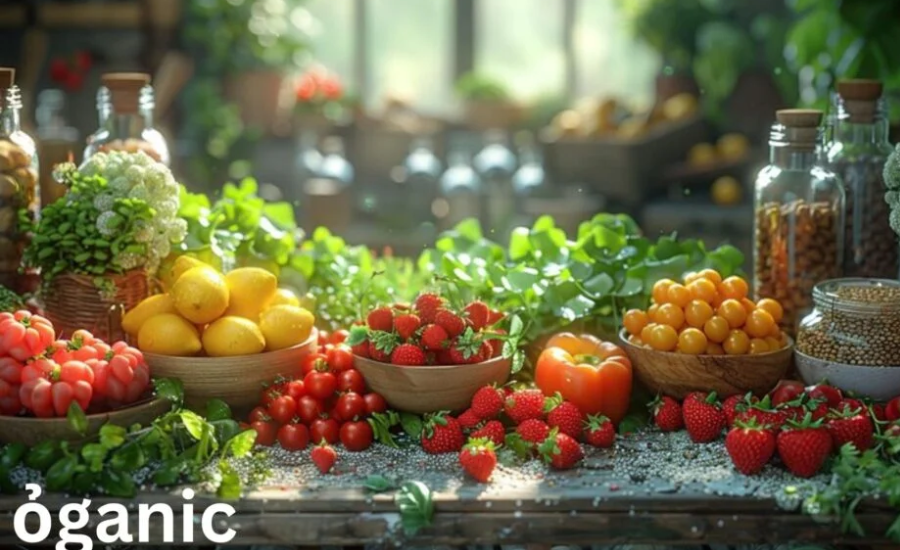When we talk about “organic,” we’re referring to a set of standards that govern how food, clothing, and other products are grown and produced. Organic farming practices emphasize the use of natural processes and materials, avoiding synthetic pesticides, chemical fertilizers, and genetically modified organisms (GMOs). The goal is to foster a system that works in harmony with nature, promoting soil health, conserving water, and e q1nhancing biodiversity.
What is Ỏganic?
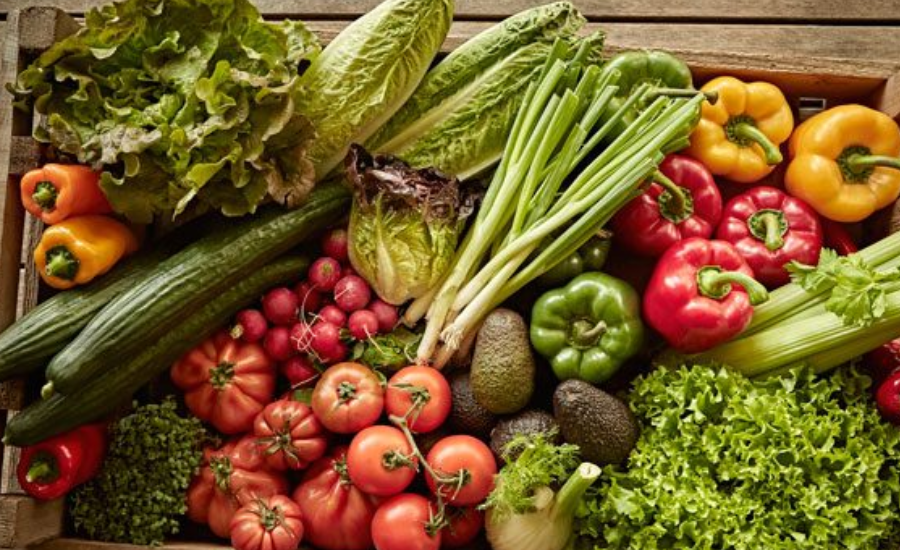
Organic refers to a classification of products derived from farming practices that emphasize sustainability and natural processes. These products are cultivated using organic farming techniques, which focus on maintaining and improving the health of entire ecosystems. By avoiding synthetic chemicals, pesticides, and genetically modified organisms (GMOs), organic farming relies on natural fertilizers, crop rotation, and biological pest control to foster healthy soil and promote biodiversity. The ultimate aim of organic farming is to nurture a harmonious balance between the environment and living organisms, from the tiniest microbes to humans, ensuring long-term sustainability and well-being for all. This approach not only supports environmental health but also contributes to the overall resilience of agricultural systems, providing consumers with food that is grown in a manner that respects nature’s intricate balance.
The Essence of Organic: A Commitment to Natural Living

“Organic” has evolved beyond a mere trend, becoming a lifestyle choice embraced by health-conscious individuals worldwide. But what does “organic” truly signify? When it comes to food and other products, organic refers to items grown or produced without the use of synthetic pesticides, chemical fertilizers, GMOs, or harmful substances. Essentially, it represents a return to nature in its most unadulterated form.
Seeing the “organic” label on foods or skincare products indicates that these items were created using sustainable practices that prioritize environmental conservation and animal welfare. Opting for organic products means choosing higher standards, supporting farmers dedicated to both consumer health and the planet’s well-being.
Grasping the significance of organic helps you make informed decisions that align with your values and contribute to a healthier ecosystem for future generations. By embracing organic living, you’re not only enhancing your well-being but also playing a role in preserving the integrity of our natural world.
A New Chapter in Our Health Journey
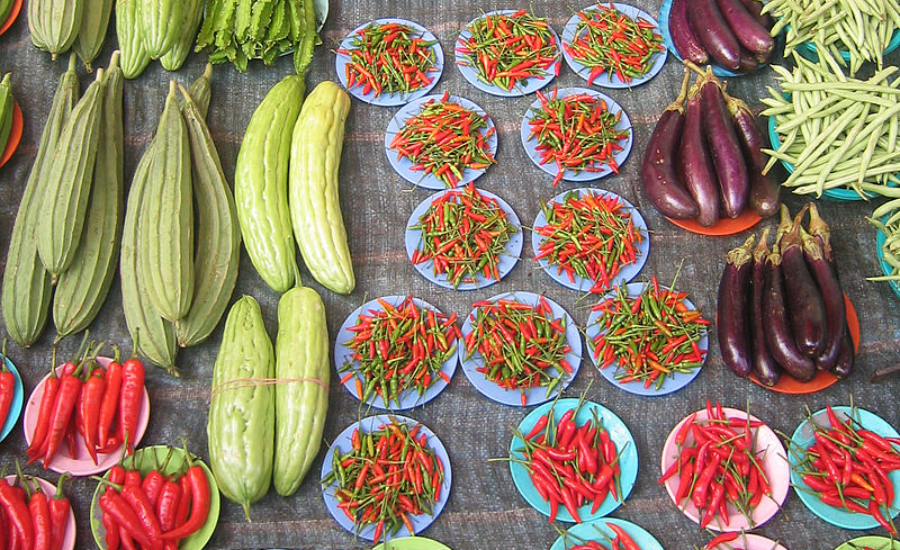
On a cool autumn afternoon, our family’s approach to health took a significant and unexpected turn. After our routine annual check-up, the doctor’s words left us with a sobering realization about our dietary habits. My youngest, Timmy, had developed food sensitivities, and I was struggling with declining energy levels. As we gathered around the kitchen table to discuss how to address these concerns, my wife proposed a bold shift—transitioning to organic foods. This suggestion, which seemed like a simple change at the time, marked the beginning of a profound transformation. It set us on a path to exploring the world of organic living, a journey that would ultimately reshape our entire perspective on health and well-being.
Core Principles of Organic Farming: A Holistic Approach to Agriculture

Organic farming is built upon a foundation of essential principles that guide its practices:
- Health: The primary focus of organic farming is to maintain and improve the health of the entire ecosystem, including soil, plants, animals, and humans. This is accomplished by using natural inputs and avoiding synthetic pesticides, chemical fertilizers, and other harmful substances that can degrade the environment and negatively impact human health.
- Ecology: Organic farming operates in harmony with natural systems and cycles, fostering biodiversity and ecological balance. By working with nature rather than against it, organic farming promotes the resilience of ecosystems, ensuring that they can sustain themselves and provide for future generations.
- Fairness: Fairness is a cornerstone of organic farming, emphasizing respect and equity for all living beings involved in the farming process. This includes ensuring that farmers and workers are treated fairly, provided with safe working conditions, and compensated justly for their labor. Additionally, it extends to the fair treatment of animals, promoting humane practices in their care and management.
- Care: Organic farming adopts a precautionary approach to environmental stewardship, prioritizing the long-term health and well-being of the planet and its inhabitants. By carefully managing natural resources and minimizing environmental impact, organic farming seeks to protect and preserve the environment for the benefit of current and future generations.
These principles collectively form the bedrock of organic farming, guiding its practices and ensuring that it remains a sustainable and ethical approach to agriculture.
The Advantages of Organic Products: A Holistic Perspective
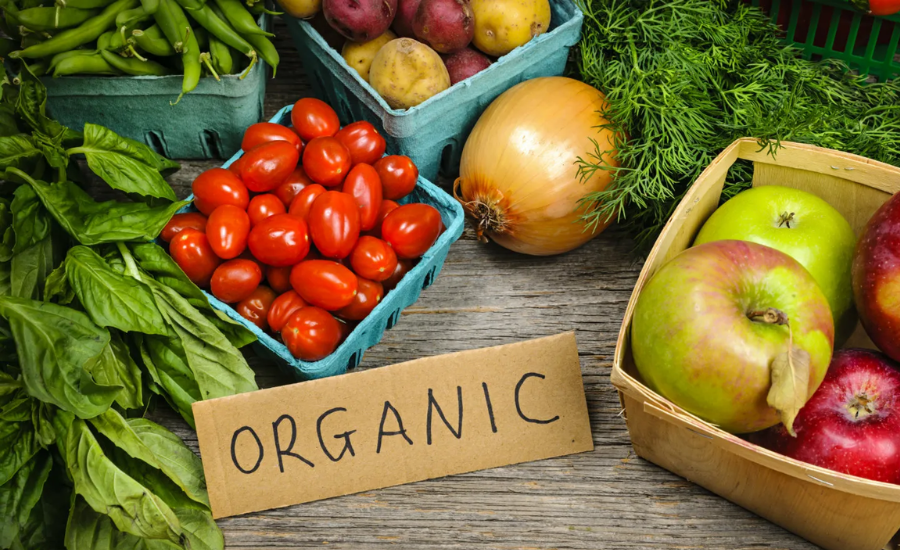
Health Advantages
One of the primary reasons people choose organic products is the belief in their potential health benefits. Organic foods are free from synthetic chemicals, such as pesticides and fertilizers, which may pose health risks. Research indicates that organic foods often contain higher levels of certain nutrients, particularly antioxidants, which are vital for overall health and wellness. By opting for organic, individuals may reduce their exposure to harmful substances and boost their intake of beneficial nutrients.
Environmental Advantages
Organic farming practices are designed with the environment in mind, focusing on sustainability and ecological preservation. These methods aim to reduce pollution, conserve water, decrease soil erosion, enhance soil fertility, and use less energy. By avoiding synthetic pesticides and fertilizers, organic farming not only protects the environment but also promotes biodiversity. In today’s world, where environmental sustainability is more critical than ever, organic farming offers a powerful solution to some of the most pressing ecological challenges.
Economic Advantages
Although organic products often come with a higher price tag compared to conventional options, they play a significant role in supporting the economic well-being of farmers. Organic farming typically requires more labor and careful management, which creates jobs and strengthens rural economies. Moreover, consumers are often willing to pay a premium for organic products, which can lead to higher profits for farmers. This economic support helps sustain communities and encourages the continued growth of organic agriculture.
By choosing organic products, consumers not only invest in their health but also contribute to environmental conservation and the economic vitality of farming communities.
Incorporating Organic into Our Daily Routine
As our dedication to organic living deepened, it became a natural part of our everyday life. We began exploring new recipes that allowed us to integrate a diverse range of organic products into our meals. Breakfasts turned into a nourishing experience with organic oats and vibrant fresh fruit smoothies, while dinners showcased hearty salads and roasted vegetables, each dish rich in flavor and nutrients. With every meal, our appreciation for organic food grew, reinforcing our commitment to a healthier, more sustainable lifestyle.
The Challenges of Organic Farming: Navigating Certification, Competition, and Consumer Awareness
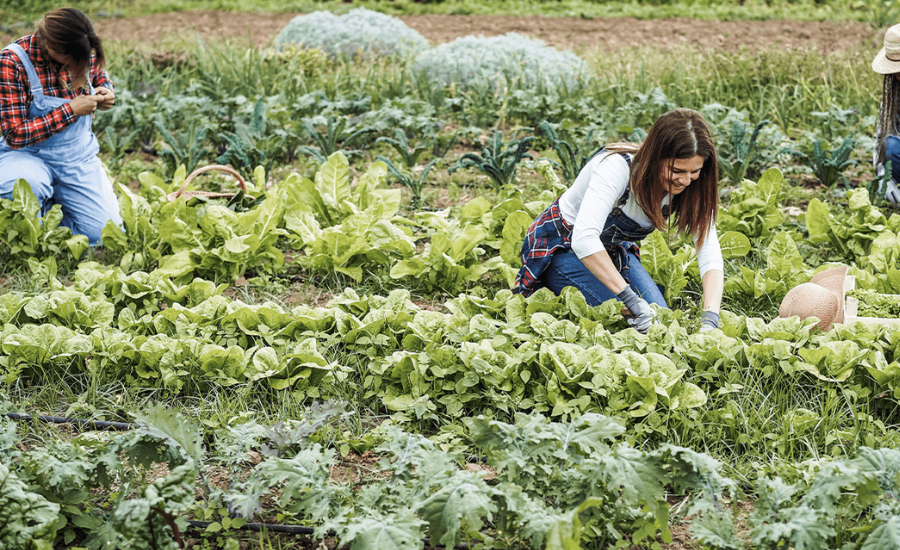
Certification and Regulation
One of the most significant hurdles in the organic farming industry is the certification process. Achieving organic certification is often both time-consuming and costly, requiring farmers to comply with rigorous standards and undergo regular inspections to maintain their certification status. For small-scale farmers, the resources needed to navigate this complex process can be a significant barrier, limiting their ability to compete in the organic market.
Market Competition
As the demand for organic products continues to rise, so does the competition within the market. Large corporations are increasingly entering the organic sector, which can create intense competition for smaller, independent farmers. This influx of big players often leads to price reductions, squeezing profit margins for small-scale organic producers who may struggle to match the economies of scale that larger companies can achieve.
Consumer Education
Although the popularity of organic products is on the rise, there remains a gap in consumer understanding of what “organic” truly means. Misinformation and misconceptions can lead to confusion and even skepticism about the benefits of organic farming. To ensure the continued growth of the organic industry, it is crucial to educate consumers about the core principles of organic farming and the advantages it offers. Clear and accurate information is essential to help consumers make informed choices that support sustainable agriculture and the environment.
These challenges highlight the complexities of organic farming, from the rigorous certification process to the pressures of market competition and the need for ongoing consumer education. Addressing these issues is vital to sustaining the growth and integrity of the organic movement.
Engaging with the Community

Our journey into organic living extended far beyond our household. We became actively involved in community initiatives that championed organic farming and nutritious eating habits. Volunteering at local farms, attending workshops, and participating in community events allowed us to deepen our connection to the organic movement. Inspired by our experiences, we started a blog to document our journey, share recipes, and offer insights into organic living. To our surprise, the blog quickly gained traction, connecting us with a broader community of individuals passionate about creating a healthier, more sustainable food system. Our involvement grew as we became advocates for organic practices, contributing to a larger movement dedicated to making positive changes in how food is grown and consumed.
The Impact of Insider Ways on Organic Awareness

Educating the Public Insider
Ways plays a crucial role in advancing the understanding and appreciation of organic products. Through comprehensive articles and expert insights into the organic industry, Insider Ways educates consumers about the various benefits and potential challenges associated with organic farming. This approach not only fosters the growth of the organic market but also empowers individuals to make well-informed choices that resonate with their personal values and health goals.
Showcasing Success Stories
A key feature of Insider Ways is its focus on success stories within the organic farming community. By highlighting the achievements and innovative practices of organic farmers, Insider Ways provides valuable inspiration and motivation for others to embrace organic methods. These stories celebrate the hard work and creativity of farmers, helping to strengthen a supportive network around the organic movement and encouraging broader participation.
Offering Practical Advice
In addition to sharing success stories, Insider Ways offers practical advice for those interested in adopting a more organic lifestyle. This includes shopping guides, tips for incorporating organic products into daily routines, and recipes that make transitioning to organic easier. These resources are designed to assist consumers in making the switch to organic products smoothly, thereby supporting their journey towards a healthier and more sustainable lifestyle.
Through its multifaceted approach, Insider Ways not only raises awareness about the benefits of organic products but also actively contributes to building a more informed and engaged community around organic living.
Tips for Embracing an Organic Lifestyle

Are you considering a shift towards a more organic lifestyle? Here are several strategies to help you seamlessly integrate organic options into your everyday routine:
1. Start with the Essentials
Begin by incorporating organic fruits and vegetables into your diet. These items are grown without synthetic pesticides and chemicals, offering a healthier option for both you and the environment. Prioritizing organic produce helps reduce your exposure to harmful substances while supporting sustainable farming practices.
2. Support Local Farmers
Explore local farmer’s markets or join a community-supported agriculture (CSA) program. These avenues provide access to fresh, organic produce directly from local growers. Not only does this support regional agriculture, but it also ensures you receive high-quality, seasonal ingredients that often taste better and are more nutrient-dense.
3. Cultivate Your Own
Consider starting a small home garden. Growing your own herbs or vegetables, such as basil or cherry tomatoes, can be both fulfilling and economical. Even if you’re new to gardening, beginning with easy-to-grow plants can be a rewarding experience and a step towards a more self-sufficient lifestyle.
4. Opt for Organic Pantry Staples
Replace conventional processed snacks and pantry items with organic alternatives. Look for certified organic labels on products like nuts, seeds, grains, and spices. This helps minimize your intake of harmful additives and supports a cleaner, more natural diet.
5. Choose Organic Beverages
Extend your organic choices to beverages as well. Opt for organic tea blends or coffee beans to enjoy a cup of your favorite drink without exposure to pesticides and artificial chemicals. Organic beverages can enhance your daily routine while maintaining your commitment to a healthier lifestyle.
By gradually integrating these practices, you can make meaningful strides towards adopting an organic lifestyle. Each small change contributes to a more sustainable and health-conscious way of living.
The Future of Organic Farming

Anticipated Growth and Challenges
As the demand for organic products rises, the organic farming industry is expected to experience substantial growth. However, this expansion must be managed thoughtfully to preserve the core principles of organic agriculture. This involves upholding rigorous certification standards, supporting small-scale farmers, and continuously educating consumers about the benefits of organic products to ensure that the industry’s integrity is maintained.
Advancements in Organic
Farming Looking ahead, organic farming is likely to benefit from ongoing innovations and advancements in sustainable practices. Emerging techniques in areas such as pest management, soil enhancement, and crop rotation are set to improve the efficiency and effectiveness of organic farming. These advancements aim to make organic farming more accessible and affordable, benefiting both producers and consumers by enhancing productivity and sustainability.
Policy and Regulatory
Support Government policies will be pivotal in shaping the future of organic farming. Supportive regulations can help lower the barriers to certification, provide financial incentives for organic farmers, and encourage research and development in organic agriculture. A favorable policy environment is essential for fostering continued growth and success in the organic sector, ensuring that the industry can meet the rising consumer demand while adhering to its foundational principles.
By addressing these aspects, the organic farming industry can navigate its growth trajectory effectively, ensuring that it remains both sustainable and true to its core values.
Facts
- Definition of Organic:
Organic refers to products produced through farming practices that emphasize natural processes, avoiding synthetic pesticides, chemical fertilizers, and genetically modified organisms (GMOs). The approach aims to maintain ecosystem health and promote biodiversity.
- Principles of Organic Farming:
- Health: Focuses on improving the health of the ecosystem, including soil, plants, animals, and humans.
- Ecology: Operates in harmony with natural systems, promoting biodiversity and ecological balance.
- Fairness: Ensures fair treatment of all individuals involved in farming and humane practices for animals.
- Care: Prioritizes environmental stewardship and the preservation of natural resources.
- Advantages of Organic Products:
- Health: Often free from synthetic chemicals and may contain higher levels of beneficial nutrients like antioxidants.
- Environmental: Reduces pollution, conserves water, decreases soil erosion, and enhances soil fertility.
- Economic: Supports farmers, creates jobs, and strengthens rural economies despite higher consumer prices.
- Challenges in Organic Farming:
- Certification and Regulation: The certification process is costly and time-consuming, creating barriers for small-scale farmers.
- Market Competition: Increased competition from large corporations can drive down prices and reduce profit margins for small farmers.
- Consumer Education: Misconceptions and lack of understanding about organic practices can hinder market growth.
- Future Outlook:
- Innovation: Anticipated advancements in pest management, soil enhancement, and crop rotation are expected to improve organic farming efficiency.
- Policy Support: Government regulations and financial incentives will be crucial in supporting organic farming growth and sustainability.
FAQs
Q: What does “organic” mean in agriculture?
A: Organic refers to farming practices that use natural methods, avoiding synthetic chemicals, pesticides, and GMOs. The goal is to promote a balanced ecosystem and sustainable agriculture.
Q: What are the core principles of organic farming?
A: The core principles include health (improving ecosystem health), ecology (working with natural systems), fairness (ensuring equity and humane treatment), and care (environmental stewardship).
Q: What are the benefits of choosing organic products?
A: Organic products can be healthier due to the absence of synthetic chemicals, benefit the environment by reducing pollution and conserving resources, and support economic stability for farmers and rural communities.
Q: What challenges does the organic farming industry face
A: Key challenges include the cost and complexity of certification, competition from larger corporations, and a need for better consumer education about the benefits and principles of organic farming.
Q: How can consumers incorporate organic options into their lifestyle?
A: Consumers can start by choosing organic fruits and vegetables, supporting local farmers, growing their own produce, opting for organic pantry staples, and selecting organic beverages.
Conclusion
Embracing organic living involves a commitment to sustainability and health. Organic farming practices, which focus on natural processes and materials, offer numerous benefits, including improved environmental health, enhanced nutrient content in food, and support for rural economies. However, the organic industry faces challenges such as complex certification processes, market competition, and the need for consumer education. Addressing these challenges through innovation, supportive policies, and increased public awareness is crucial for the continued growth and success of organic farming. By integrating organic practices into daily routines and making informed choices, individuals can contribute to a healthier lifestyle and a more sustainable world.
Read More: England Buzz
